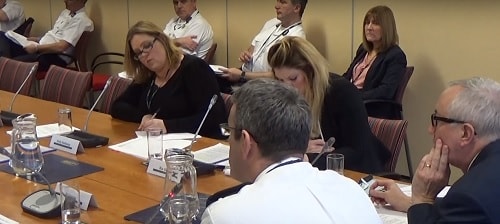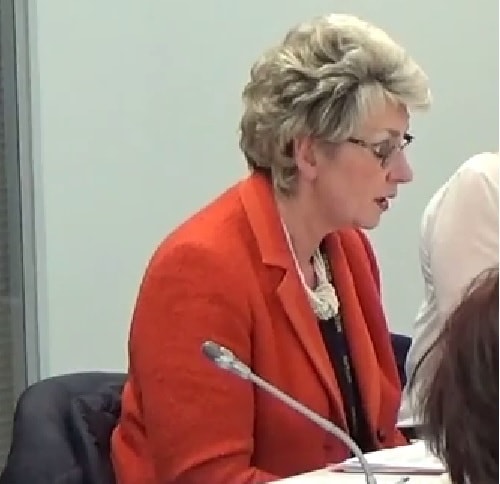Deputy Chief Fire Officer Phil Garrigan tells councillors “90 working days” are lost each year in responding to FOI requests
Please accept YouTube cookies to play this video. By accepting you will be accessing content from YouTube, a service provided by an external third party.
If you accept this notice, your choice will be saved and the page will refresh.
Councillors on the Performance and Scrutiny Committee (Merseyside Fire and Rescue Authority) discuss Freedom of Information requests (starts at 15m 35s) (12th January 2016)

Although I am not referred to by name (but my profession is in the report), I have made Freedom of Information requests to Merseyside Fire and Rescue Service/Merseyside Fire and Rescue Authority during the period covered by that report. An appeal of a refusal of one of those Freedom of Information requests to the Information Commissioner’s Office is referred to in the report in section 16. I am therefore declaring this as an interest at the start of this piece.
I have previously written about Merseyside Fire and Rescue Authority’s response to the consultation on changes to Freedom of Information legislation.
Yesterday councillors on Merseyside Fire and Rescue Authority’s Performance and Scrutiny Committee discussed a report on Freedom of Information requests.
The report was introduced by Deputy Chief Fire Officer Phil Garrigan, who said “Thanks Chair, again this report relates to our response to a request from Members to better understand the implications of the Freedom of Information requests on the Authority and the report proposes to, it requests that Members review the information in relation to Freedom of Information requests and particularly the Freedom of Information Act 2000.
What I would say from the outset is that Merseyside Fire and Rescue Authority adheres to and is supportive of the Freedom of Information Act and values its role in allowing people to access information, giving them the right to find out about matters and decisions that affect them. I’d like to be absolutely crystal clear around that.
However, use of the Act is becoming increasingly popular and the volumes of freedom of information requests have increased over the recent years. The table on page 58 exemplifies that. We received, we saw freedom of information requests in 2011 at 72, 2014 at 138 and up until November 9th 2015 at 131.
So it’s clear evidence that the freedom of information requests coming through to Merseyside Fire and Rescue Authority has increased significantly over that period and you know Members will also be aware that we’ve been receiving those freedom of information requests it’s a requirement on us to turn around that information within twenty days unless we are able to provide you know a legitimate reason as to why we wouldn’t provide that information and even then we’d have to evidence that and reply to the particular individual who’s requested the information.
What we also recognise is that there are different courses of action that we could take. You know a) providing the information, redacting the information, refusing to supply the information by applying an exemption or determining that the work required to pull the information together is disproportionate and then notifying the application that it’s available by other means or by determining the request is vexatious and certainly the Information Commissioner has said you know when challenged around freedom of information and the number of requests it is always available for an authority or an organisation to reject it on the basis that it’s a vexatious request, but equally Members will appreciate the fact that that is quite challenging in that regard because it seems very protectionist, it seems as though we would be withholding information from a public member or an organisation on that basis and it’s very difficult to legitimise that in my view and more often than not the individuals, the staff who are seeking to provide that information will go way beyond what’s expected to provide that information as accurately as they are able to.
But it does place demands on our organisation, particularly as our organisation continues to reduce in size and when we look at the, our attempts to protect our front line operational response and we look at, it’s incumbent on us that we look at the support services that maintain the Service outside of our operational firefighters. So our non uniformed colleagues and uniformed colleagues are spending a significant amount of time dealing with freedom of information requests. So the organisation is shrinking but the demand around freedom of information is increasing.
So what the report does is it recognises that fact, it appreciates the fact that you know we will get a multitude of different requests in, some from you know members of the public, but some extended to journalists and so on and so forth and representative bodies who are utilising the information not in my view for how it was necessarily meant to be utilised in the first instance and also we have requests coming from organisations and companies where they are seeking to achieve you know some competitive advantage and I’m not sure again that was the basis of what the Freedom of Information Act was all about, but drawing all that in then and you know certainly it’s already been recognised as there’s been an independent Commission that has been invoked to review the Freedom of Information Act and we have provided a response to that saying that we are certainly for legitimate and less vexatious requests and maybe a levy or a charge may be applicable to kind of ensure that they are genuine and not repeated and that would maybe prevent some of the prolific you know press requirements being met when such a charge is applicable.
However the Information Commissioner has published a response in relation to that consultation which says, which argues against the introduction of fees and as I say you know starts to suggest that authorities should use section 14 which is around vexatious requests to avoid responding to the ones that were deemed to be you know vexatious in their very nature.
However you know in regards to that as I’ve previously stated, paragraph 12 describes the challenges around describing something as vexatious and that’s not something we would want to be perceived to be defensive over the policies and procedures that we’ve adopted as an Authority. I’m not sure we would want to be, or I certainly know we would want to be as transparent and open as possible but nevertheless what does that mean in reality?
In reality it means that since July 2015 through November, 32 complete requests have been responded to and the total of hours that have been attributed to that to deal with those requests 153 hours, which equates to 4.8 hours per a request for information. When you extrapolate that over the twelve month period it equates to 629 hours which again would be in effect is about 90 days of a person who is being responded to and obviously that’s a collective person because that’s an hour of one department, two hours of another, three hours of another and so on and so forth, but in totality it’s about 90 working days that’s lost from this Authority in responding to freedom of information requests at a time when we would be better focussed on our attentions on the delivery of the service and as I say protecting the front line.
However that is the kind of realities and again this is not about us, you know, challenging the utilisation of freedom of information but certainly it questions its actual usage in its broader sense and who actually uses it for what reasons.
When you then as part and parcel of our response to the consultation we asked staff members about what they felt the implications were for themselves and they are detailed in paragraph 19.
But what I would say in kind of closing and given that the kind of clarity of 90 working days lost to responding to freedom of information requests, I’ll just bring you back to the legal implications. Merseyside Fire and Rescue Authority has a duty under the Freedom of Information Act to deal with requests promptly and in the event no later than 20 working days after receipt of the requests.
Merseyside Fire and Rescue Authority can exercise its rights under the Act if an exemption has been correctly applied and in most cases the public interest test is then applied to ensure any exemptions are correctly applied under those circumstances.
So there are ways in which we can deal with them, but again just to reiterate the point, our intent is to be as open and transparent as possible. We are you know responding to each and every one and it does incur a significant cost associated with them of 90 days across the whole 12 months of the organisation irrespective of who necessarily deals with them but certainly there are members of certain teams who spend an inordinate amount of time dealing with requests. I’m happy to take any questions on that Chair.”
If you click on any of these buttons below, you’ll be doing me a favour by sharing this article with other people. Thanks:


